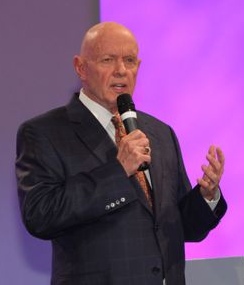Стивен Кови знаменитые цитаты
Стивен Кови Цитаты о мужчинах
дух
Источник: Семь навыков высокоэффективных людей
парадигма
Источник: Семь навыков высокоэффективных людей
Стивен Кови Цитаты о жизни
„Сделайте вашу работу наполненной жизнью, а не жизнь наполненной работой.“
Make your life work instead of making life full of work.
«Важные дела в начале»
„Наша жизнь — результат сделанных нами выборов.“
Our life is result of our choices.
«Важные дела в начале»
парадигма
Источник: Семь навыков высокоэффективных людей
Стивен Кови цитаты

„Мудрость — это взаимодействие разума и сердца.“
Wisdom is synergy of mind and heart.
«Важные дела в начале»
„Концепция без жизненных ценностей может создать Гитлера.“
Vision without values may create Hitler.
«Важные дела в начале»
„Живите в соответствии со своим воображением, а не своим прошлым.“
Живите, исходя из вашего воображения, а не вашей истории.
„Пока вы живёте, учитесь жить.“
Until you live, learn how to live. Ср. с русской поговоркой Век живи — век учись.
«Важные дела в начале»
Вариант: Пока вы живёте, учитесь жить.
Best's enemy is Good.
парафраз от «Лучшее — враг хорошего» (впервые — в комментарии итальянского автора М. Джованни (1574) к «Декамерону» Боккаччо)
Приписываемые цитаты
Источник: Энциклопедический словарь крылатых слов и выражений / составитель В. В. Серов — М.: «Локид-Пресс», 2005.
„Мы так часто пилим, что совсем забывает заточить пилу.“
Often we are so busy with sawing that we forget to sharpen the saw.
«Важные дела в начале»
„Вместо того, чтобы разглядывать фрагменты, попробуйте увидеть полную картину.“
Instead of looking at fragments, try to see the whole picture.
«Важные дела в начале»
парадигма
Источник: Семь навыков высокоэффективных людей
There will be real happiness, peace of mind and balance, when living by heart and right-mindedly.
«Важные дела в начале»
образ
Источник: Семь навыков высокоэффективных людей
„Наши создают наследство нашим детям.“
Our choices make the legacy to our children.
«Важные дела в начале»
<math>\textstyle\frac{3}{4}</math> of world problems and bewilderment would be lost if we understood our opponents.
«Важные дела в начале»
Стивен Кови: Цитаты на английском языке
“To change ourselves effectively, we first had to change our perceptions.”
Источник: The 7 Habits of Highly Effective People: Powerful Lessons in Personal Change
Источник: The 7 Habits of Highly Effective People
Источник: The 7 Habits of Highly Effective People: Powerful Lessons in Personal Change
“When the trust account is high, communication is easy, instant, and effective.”
Источник: The 7 Habits of Highly Effective People: Powerful Lessons in Personal Change
“We see the world, not as it is, but as we are──or, as we are conditioned to see it.”
Источник: The 7 Habits of Highly Effective People: Powerful Lessons in Personal Change
Источник: The 7 Habits of Highly Effective People
“It's not what happens to us, but our response to what happens to us that hurts us.”
Источник: The 7 Habits of Highly Effective People: Powerful Lessons in Personal Change
Источник: The Seven Habits Of Highly Effective People (1989), p. 12
Источник: The 7 Habits of Highly Effective People: Powerful Lessons in Personal Change
“Happiness, like unhappiness, is a proactive choice.”
Источник: The 7 Habits of Highly Effective People: Powerful Lessons in Personal Change
“Habit is the intersection of knowledge (what to do), skill (how to do), and desire (want to do).”
Источник: The 7 Habits of Highly Effective People: Powerful Lessons in Personal Change
Источник: The 7 Habits of Highly Effective People: Powerful Lessons in Personal Change
Источник: The 7 Habits of Highly Effective People: Powerful Lessons in Personal Change
“The ability to subordinate an impulse to a value is the essence of the proactive person.”
Источник: The 7 Habits of Highly Effective People: Powerful Lessons in Personal Change
“We are not human beings on a spiritual journey. We are spiritual beings on a human journey.”
Pierre Teilhard De Chardin, in The Phenomenon of Man [Le Phénomène Humain] (1955); Covey quotes this in Living the 7 Habits : Stories of Courage and Inspiration (2000), p. 47
Variant: We are not human beings on a spiritual journey. We are spiritual beings on a human journey.
A paraphrase of De Chardin's statement which has also become misattributed to Covey.
Misattributed
Вариант: We are not human beings having a spiritual experience; we are spiritual beings having a human experience.
“Courage is not the absence of fear but the awareness that something else is more important.”
Foreword to Prisoners of our Thoughts : Viktor Frankl's Principles at Work (2004), by Alex Pattakos, p. x
This statement has also been attributed to James Neil Hollingsworth (AKA: Ambrose Redmoon) in an article entitled "No Peaceful Warriors!" for Gnosis Magazine #21, in 1991.
Источник: The 7 Habits of Highly Effective People: Powerful Lessons in Personal Change
“Live out of your imagination, not your history.”
As quoted in Wake-up Calls : You Don't Have to Sleepwalk through your Life, Love, or Career! (1992) by Eric Allenbaugh, p. 65
“Our behavior is a function of our decisions, not our conditions.”
Источник: The 7 Habits of Highly Effective People: Powerful Lessons in Personal Change
“People simply feel better about themselves when they’re good at something.”
Источник: The 8th Habit: From Effectiveness to Greatness
Источник: The 7 Habits of Highly Effective People: Powerful Lessons in Personal Change
Источник: The 7 Habits of Highly Effective People: Powerful Lessons in Personal Change
“People can't live with change if there's not a changeless core inside them.”
Источник: The 7 Habits of Highly Effective People: Powerful Lessons in Personal Change
